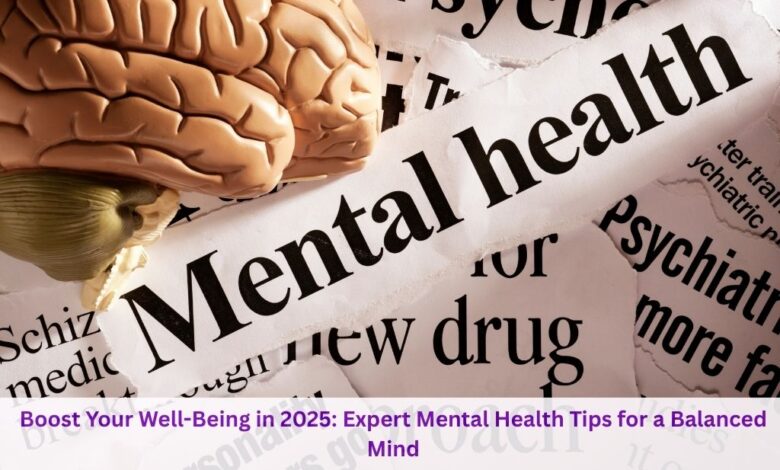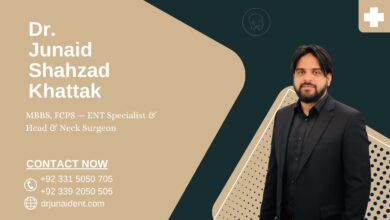Boost Your Well-Being in 2025: Expert Mental Health Tips for a Balanced Mind

Taking care of mental health has become one of the most important conversations in 2025. People search every day for simple and effective mental health tips. On Google Trends, topics like digital detox, mindfulness, workplace burnout, men’s mental health, and AI therapy apps are showing a clear rise. This shows how much people are looking for expert backed advice that can help them live with more balance and peace.
The truth is that mental health is not a luxury. It is the foundation of good relationships, productivity, and overall happiness. In the middle of fast life, constant notifications, and the pressure to stay ahead, these small but powerful practices can make a huge difference.
Experts concur that mental well-being begins with easy daily rituals. Taking a walk outside for as little as fifteen minutes of nature can reduce stress and revitalize the mind. A lunchtime walk, a seat close to an urban green area, or even having plants indoors can boost mood. It seems too simple, yet this routine is endorsed by neuroscience.
Nature reduces stress hormones and provides the brain with an opportunity to reboot. When you add clean air to conscious movement like walking or stretching, the effect is even greater. Most mental health professionals suggest daily movement not as exercise per se but as a means of releasing tension and managing emotions.
Another popular topic is quality sleep. Individuals are now understanding that sleep is not just rest. Proper sleep is a type of therapy for the mind. Neuroscientists describe how sleep removes toxins, stores memories, and recalibrates emotional equilibrium.
Without it, mood swings, irritability, and difficulty concentrating become the norm. In 2025, searches on how to sleep well and how to correct bedtime habits are on the rise. Basic advice such as having a regular sleep time, not using screens an hour before going to bed, and keeping the room cool and dark is sufficient to bring about great improvement. Sleep hygiene is simple, but it is all about being consistent.
Food also directly contributes to emotional well-being. The connection between gut health and mental health is being explored more and more. Balanced protein consumption, in the form of lean meat, fish, beans, or lentils, aids in the production of neurotransmitters that control mood.
A whole food diet, vegetables, nuts, and healthy fats supply the brain with fuel. Reducing processed sugar and junk food intake prevents mood crashes.
Nutritionists also point out that home cooking and sharing meals with family and friends has an emotional advantage too. Shared meals create connection, and that too is protective of mental health.
Kindness and gratitude are two trends that don’t fade away. Increasingly, people are looking for gratitude journaling and easy practices in appreciation. It’s a shift in attitude that results from taking three minutes a day to write down three things you’re grateful for.
Focusing less on problems and more on good things happens with this habit. Small acts of kindness are suggested by experts as well. Smiling at a stranger, giving a friendly text message, or being there for a person in need picks up both parties. Such actions form a cycle of good that makes the brain less vulnerable to stress.
Social connection is another main area. Humans are designed for community. Research indicates that isolation can harm health as much as smoking.
Having healthy relationships and having positive friendships are vital to well-being. Peer support groups are also on the rise online. Whether through stress, anxiety, bereavement, or burnout, being part of a group where individuals have shared experiences combats loneliness.
Google Trends also reflects more individuals looking for men’s mental health support. Dispelling stigma and starting conversations for men is a step forward.
Mindfulness and meditation are still going strong in 2025. Individuals are stepping away from lengthy complex practices and looking for short breathing exercises and micro-meditations.
Even a couple of minutes of conscious breath during a stressful situation can calm nerves. Apps and audio instructions now provide one to three minute sessions catering to busy lifestyles. This makes mindfulness accessible and less daunting. Journaling is another self-recovery strategy that remains popular. Putting feelings down processes emotions and keeps them from accumulating.
Digital detox is presently among the top most searched mental health terms. Exposition to screens, social media comparison, and continuous news cycles bring psychological overload. Psychologists say limit screen time and establish boundaries with technology.
One does not need to delete social media for good. One should use it mindfully. A few questions to ask oneself are “What for? Why now? What else can I do instead?” breaks the cycle of infinite scrolling.
Families are also implementing rules such as no phones at the table or screen free nights to enhance connection. Burnout in the workplace is also a popular Google search.
Work related stress is one of the largest mental health issues of today. Wellness initiatives work, but experts note that it’s in the workplace culture that the real shifts occur. Flexible schedules, mental health days, understanding managers, and peer acknowledgement are more important than a yoga app on company phones.
Supported employees are more productive and less likely to quit. This is why workplace well-being is now a competitive advantage for organizations.
Financial strain is usually unseen but has a powerful influence on mental wellness. Money issues lead to worry, sleeplessness, and even relational conflict.
Simple actions such as expense tracking, building an emergency fund, or learning core budgeting can alleviate fear. Financial therapy and money coaching are expanding practices in 2025. Individuals are catching on that financial well-being is a component of emotional well-being.
Minimizing comparison with others’ lives on social media is also key digital wellness practice.
Seasonal depression and climate anxiety are increasing searches. As weather and daylight hours change, people seek ways to manage. Light therapy lamps, exercising indoors, and vitamin D supplements under medical supervision are among the typical fixes.
Staying connected to others during dark times is also a protective measure. Climate change itself is impacting mental health as people fear the future. Solutions recommended by experts include reframing that anxiety as a call to action, which turns fear into empowerment.
Creativity is another underappreciated but potent weapon for mental well-being. Doing things such as drawing, gardening, music, or cooking decreases stress. The beauty is not in the end product but in the process itself.
Creative activity engages the reward system in the brain and creates a healthy outlet for feelings. Psychologists urge individuals to attempt “no pressure creativity sessions” for twenty minutes once a week. It enhances mood and aids in problem solving.
Mental health AI tools are becoming a part of daily queries. There are apps such as Woebot and other AI driven chatbot that offer immediate assistance. Wearables that monitor stress, heart rate, and sleep now provide real time mental health recommendations.
These tools are not a substitute for therapy but make it more accessible. They are particularly helpful for individuals who cannot access experts promptly. Ethical practice is crucial but the trend indicates that digital technology will continue to expand in mental health care.
Perfectionism is another hidden struggle. Many people confuse it with high standards. In reality, perfectionism leads to stress, procrastination, and burnout. Self-compassion is the antidote.
Treating yourself kindly and forgiving mistakes helps reduce pressure. Experts suggest pausing when self-criticism appears and asking, “Would I say this to a friend?” If not, it is time to reframe the thought in a gentler way. Self-compassion increases motivation more than harshness ever does.
Meta trends also indicate that individuals are seeking resilience training. It is not about dodging stress entirely but in developing the capability to deal with it. Resilience develops when you integrate small daily habits such as sleep, nutrition, gratitude, and mindful breaks.
It also develops from connection, purpose, and caring for others. Even in dark days, these habits generate strength. Mental health in 2025 is no longer just about crisis. It is prevention, lifestyle, and tiny steps that keep the mind robust.
Action today is important. Mental health isn’t done in a single step. It is a long-term habit of small steps. Whether you decide to begin with a daily thankfulness journal, a short walk, a decreased screen time objective, or calling a pal, each step counts.
By establishing consistent habits, you create emotional balance and strength. The world will forever present challenges, but with the proper tools you can meet them with strength rather than fear.
Expert endorsed health guidance demonstrates that looking after your mental well-being is not complicated. It is all about getting back to simple habits that fuel your mind daily.
Another need that needs emphasis is prevention. For decades, mental illness was only talked about after a disaster. Now, more individuals are inquiring how to avert burnout before it occurs.
Prevention methods such as cognitive behaviour therapy sessions, office wellness programs, and changes in lifestyle are increasing importance. Even schools are incorporating mindfulness breaks and emotional learning. Instructing kids on how to regulate emotions early sets the stage for life. This preventive strategy can alleviate the burden on health systems and build better societies.
International consciousness is also transforming the future of mental health. Climate concern, economic worry, and unprecedented technology advancement touch lives everywhere. Digital resources, however, enable resources to spread far and wide.
An individual in a small town can now access therapy over the internet, connect with a peer support group, or seek advice from an AI chatbot. This ease of access is bringing hope to those who might have kept quiet in the past.
The taboo surrounding therapy is also gradually disappearing. Celebrities, sports people, and businesspeople share their battles freely, and it becomes more acceptable for others to do the same.
Finally we can give out the message that mental wellbeing is as vital as physical wellbeing. A healthy mind sustains a healthy body, and the two together create a rich life.
Small actions such as sleeping well, being grateful, staying in touch, keeping screen time to a minimum, and getting help when needed are actions toward resilience.
These actions might seem insignificant, but when done every day they form strong change. You do not have to be a master of everything all at once. Even one habit consistently practiced can change your mood, enhance concentration, and decrease stress.




